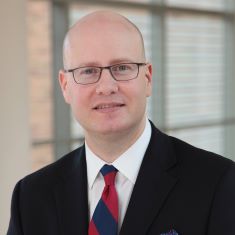
Jeremy L. Davis, M.D.
- Center for Cancer Research
- National Cancer Institute
- Building 10, Room 4-3760
- Bethesda, MD 20892
- 240-858-3731
- 301-480-4972
- jeremy.davis@nih.gov
RESEARCH SUMMARY
Dr. Jeremy L. Davis left CCR in January 2025. He is a surgical oncologist whose research focused on sporadic and inherited forms of stomach cancer, specifically those caused by germline mutations in the CDH1 gene, and the molecular underpinnings of gastric cancer development and metastasis. Dr. Davis is board certified in both Complex General Surgical Oncology and General Surgery.
Areas of Expertise

Jeremy L. Davis, M.D.
Research
A Focus on Stomach Cancers
Dr. Davis’ research focused on sporadic and inherited forms of stomach cancer, specifically those caused by germline mutations in the CDH1 gene, and the molecular underpinnings of gastric cancer development and metastasis. He was the principal investigator of multiple clinical trials being conducted at NIH Clinical Center. He lead the NIH Foregut Team, a multidisciplinary team of experts dedicated to the clinical care and research of patients with diseases of the upper gastrointestinal tract.
Hereditary Diffuse Gastric Cancer (HDGC) Syndrome
Mutation of the tumor suppressor gene CDH1 is a frequent cause of the hereditary diffuse gastric cancer (HDGC) syndrome, which is associated with gastric adenocarcinoma, lobular breast cancer, and cleft lip/palate. Loss of CDH1 gene expression in the stomach, and resultant signet ring cell formation, is considered the initial step in stomach cancer formation in patients with HDGC. Although this is a critical step in HDGC development it must be followed by other crucial changes in gastric epithelial cells, which have not yet been identified.
Furthermore, gastric adenocarcinoma with diffuse-type histology and signet ring cells is increasing in incidence and disproportionately affects young and female patients. Early peritoneal (i.e. abdominal cavity) cancer spread is a unique and enigmatic feature of this cancer type. Identification of the initial genetic changes in the cells which line the stomach and lead to invasive gastric cancer may reveal markers useful for early detection and targeted therapy in both hereditary and non-hereditary forms of gastric cancer.
Our hypothesis is loss of CDH1 gene expression alone is insufficient for development of HDGC, and that additional gain or loss of other critical cancer-related genes is required for signet ring cell growth and gastric cancer progression. Disruption of the elements needed for cells to connect to (cell adhesion), communicate with (cell-cell signaling), and move about (motility) each other have all been linked to the development of gastric cancer. Our research goal is to identify the changes in stomach cells that lead to gastric cancer so that we may: (1) better select patients with CDH1 mutation for risk-reducing total gastrectomy; (2) identify targets for treatment of patients diffuse-type gastric cancer. These research discoveries may also help identify preventative treatments to reduce the risk of cancer development in patients with HDGC and therefore eliminate the need for total gastrectomy.
The gastric cancer research program is working toward these goals by: (1) Isolating and fully characterizing signet ring cancer cells from the mucosa of patients with germline CDH1 mutations; (2) Establishing critical elements for implantation and growth of gastric cancer metastases. This contribution is significant since it will establish the critical pathway(s) necessary for early diffuse gastric cancer growth and progression. Our gastric cancer research is made possible by four NCI/CCR and IRB-approved clinical studies of patients with hereditary and non-hereditary forms of gastric cancer.
Publications
- Bibliography Link
- View Dr. Davis' PubMed Central Summary.
Early immune changes support signet ring cell dormancy in CDH1-driven hereditary diffuse gastric carcinogenesis.
Costs of Cancer Prevention: Physical and Psychosocial Sequelae of Risk-Reducing Total Gastrectomy
Cancer surveillance as an alternative to prophylactic total gastrectomy in hereditary diffuse gastric cancer: a prospective cohort study
Decision-making and regret in patients with germline CDH1 variants undergoing prophylactic total gastrectomy.
Association Between Hereditary Lobular Breast Cancer Due to CDH1 Variants and Gastric Cancer Risk
Biography

Jeremy L. Davis, M.D.
Dr. Davis completed his surgery training at Indiana University and an additional three years of cancer research at the NCI. He received advanced training in surgical oncology at Memorial Sloan Kettering Cancer Center and is board certified in both Complex General Surgical Oncology and General Surgery.
Dr. Davis left CCR in January 2025.